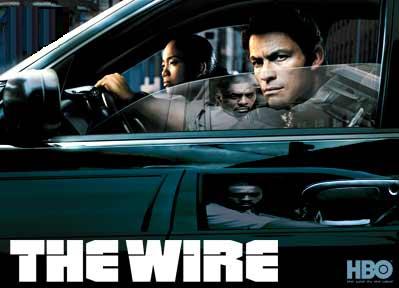To say The Wire beats every other ‘cop show’ in the public domain would be an understatement. It eclipses them in every aspect.
Firstly, we shall state, it is not a ‘cop show’ at all. It is more comparable to a series of books that illustrate exquisitely and in such detail ‘the condition of man in the 21st century’, through the issues faced by largely poverty-stricken, inner-city Americans.
Each episode opens with an epigraph denoting the crux of that ‘chapter’s’ particular issue.
The producers, HBO, have a penchant for fantastic programming and although the medium of television is saturated with meaningless, shallow offal, HBO often deliver quality. Their flagship shows like The Sopranos and Six Feet Under display this and The Wire in some aspects outclasses even them.
The term Greek Tragedy is applicable to the show. It deviates from what America and the UK regularly seek for amusement. This is due to the belief of the writers (in particular David Simon) that life is a tragedy and viewing it as such holds power; the power to grant perspective and inspire honesty.
Largely down to the commitment of the writing, directing and casting teams, this show erupts beyond the confinements of contemporary entertainment.
To exemplify this we need look no further than the show’s head writer David Simon. A former reporter for the Baltimore Sun, he knows the city in which the series is set. The importance of honesty and realism are clear from the dialectal nuances in the script writing, imperfect characters, inclusion of real ‘ex-players’ from Baltimore in the cast, flawless cinematography and phenomenal soundtrack.
A quote from Simon himself illuminates us as to the core themes of the show:
‘The point of view is middle-management, and labour is diminished and the institution is paramount.’
Now we have context, we can move onto the specifics of season one. The preliminary response to the first episode may well be, ‘too many characters’ or ‘Christ that was dry’. If you have never watched it before and have those feelings after the first episode, DO NOT LISTEN TO THEM.
A large part of the show’s appeal is the plethora of characters presented to you. Being spoon-fed stereotypes happens far too often so when a show credits the viewer with being intelligent enough to invest and infer things about characters it is not only refreshing but rewarding.
In short, season one introduces us to the Baltimore Police department and a successful drug dealing racket. The focus within the police department in this series is directed towards a detail, headed by Lieutenant Cedric Daniels, with the primary investigators being Detective Jimmy McNulty and Detective Kima Greggs. The unit was set up after said drug racket beat a murder trial for one of its mid-level workers. This character’s name is D’Angelo Barksdale, he is nephew to the boss, Avon Barksdale who works alongside lifelong friend Russell ‘Stringer’ Bell.
We follow closely the two characters of D’angelo Barksdale and Lt. Daniels as the show cleverly draws parallels between them. The similarity is striking and thought provoking in that it rubbishes typical good guy, bad guy standpoints via the twinned pressures Barksdale and Daniels face.
Throughout the season Daniels is subject to the morally conflicting demands of his investigators, especially McNulty who represents the disillusioned, unstable labourer, and his politically driven superiors, Major Rawles and Deputy Ops Burrel.
Similarly, Barksdale is faced with opposing stresses. He must school and do right by his younger dealers such as Wallace, Bodie and Poot to ensure smooth business. However the hierarchy sends down confusing orders which compromise the already wavering morality of D’Angelo.
As a result, D’Angelo’s story is the most intriguing. Departing pearls of wisdom to his underlings such as an explanation of labour in America using a McNugget analogy and outlining how trapped all players in ‘the game’ are utilising a chessboard; he captivates you as a viewer.
Chess:
Mr. McNugget:
We are given multiple other fascinating characters to follow including an addict and police informant named Bubbles. His daily strife on the streets adds to the already incredible sense of place and supplies a terrifically tangible perspective of the game.
Bubbles fishing:
Other ancillary characters such as Freamon, Herc, Carver, Pryzbylewski, Bunk for the police further the feel of the politically motivated department in their own exciting ways. One character who could not go without a mention though is homosexual stick-up boy Omar Little.
Omar’s profession of robbing drug dealers means he is not only dangerous but incredibly likeable. His morality and ‘code’ of living are dubious but respectable, as is his intellectual prowess in planning robberies and setting up those he dislikes. He is affected markedly by the actions of others, in particular Barksdale’s organisation; his story is another of great profoundness.
Omar comin’!:
All of the characters not elaborated upon are spectacular in their own right and only by watching will the message truly embed itself in your mind.
‘The Wire’ season one is compelling and leaves one with an insatiable appetite for more. It is simply a beautiful work of art and one with a vital message.
No wonder it is studied at Harvard.
http://www.law.harvard.edu/news/spotlight/civil-rights/ogletree-race-and-justice-the-wire.html

